Why Thyroid Disease Isn’t Solved With Just Food
Every year, tons of people get diagnosed with hypothyroidism. That’s when your thyroid gland just isn’t cranking out enough hormones—T4 and T3—to keep your metabolism, mood, and energy steady. Look, nobody enjoys taking a daily pill just to feel normal. The idea of using food—clean, wholesome, naturally healing—to ditch meds altogether is pretty tempting. You see it everywhere: influencers swearing by kale smoothies, juice cleanses, or fancy protocols that promise to "heal your thyroid" without medication. Before you start shopping for exotic superfoods, here’s the truth. When your thyroid’s busted, no amount of salad or coconut oil can magically make it work again. For most, hypothyroidism happens because your own immune system has attacked the gland (hello, Hashimoto’s). Your body can’t store or make enough thyroid hormone by itself once it’s fried. That’s why the standard fix is to give you those missing hormones with a medication like levothyroxine (also called Synthroid).
Researchers at places like the Mayo Clinic and American Thyroid Association have looked at every nutrient and diet out there. So far, there’s no evidence a diet—vegan, paleo, gluten-free, or whatever hot trend—can bring someone’s thyroid hormone back to normal levels when the gland itself is damaged. Sure, nutrition absolutely matters for thyroid health, but it’s not a one-turn fix for a broken system. If you’re already hypothyroid and your TSH is high, skipping meds doesn’t just leave you tired and out of sorts. It can mess with your heart, wreck your cholesterol, and put you at risk for depression and fertility trouble. That said, there’s lots you can do with food and lifestyle tweaks to help your body (and brain) feel better even on meds. Knowing what’s hype and what’s legit could keep you from wasting money on bogus "thyroid healing" programs or supplements.
The Role of Nutrition in Thyroid Function—Facts vs. Hype
It’s easy to get overwhelmed. Is soy good or bad? Should you eat kelp for iodine? Will gluten inflame your thyroid? Let’s break it down without the food fear-mongering. First off, your thyroid needs a short list of nutrients to make hormones. Iodine is a big one—it acts like fuel for your thyroid. But here’s the catch: In countries like the US and Canada, with iodized salt, true deficiency is rare. Loading up on extra iodine, like through seaweed or supplements, can actually backfire. Too much can trigger thyroid dysfunction, especially in folks with autoimmune issues.
Selenium is another nutrient that gets lots of buzz. It is used to convert T4 to T3 (the active thyroid hormone). Brazil nuts are loaded with selenium, but you only need one or two to meet your daily needs. Zinc, iron, and vitamin D are also important for healthy thyroid function. Being low in any can drag your metabolism and mood. Bloodwork can help you figure out if you need more.
What about the so-called thyroid “troublemakers”? Some believe gluten is a universal enemy, especially for people with Hashimoto’s. It’s true, people with autoimmune thyroid problems have a higher risk of celiac disease. If you actually have celiac, a gluten-free diet is non-negotiable. If not, there’s no proof giving up gluten helps everyone with thyroid disease. The story is similar with soy. Soy foods can slightly slow thyroid hormone absorption if you eat huge amounts, but for most people, they’re fine as part of a balanced diet—especially if you take your meds far away from mealtime.
Cruciferous vegetables—think broccoli, kale, Brussels sprouts—used to get a bad rap due to goitrogens, compounds that might interfere with thyroid function. Realistically, you’d have to eat pounds of these raw every day to see an effect. Cooking breaks most of that down. For everyday eaters, these veggies are powerhouses full of fiber and antioxidants. Don’t let food myths scare you off real nutrition. As one endocrinologist puts it:
“There are no miracle foods that cure hypothyroidism… Dietary choices matter, but no single food or diet is going to turn a broken thyroid back on.” — Dr. Anne Caplan, MD, Endocrinologist

Hormone Replacement Therapy: Why It’s Still the Gold Standard
So, if there’s no magic food, why do people cling to the idea that they can ditch meds for diet? Some of it’s wishful thinking, for sure. Nobody likes being stuck on a lifelong prescription. But here’s what helps to keep in perspective. Synthetic thyroid hormones like Synthroid (levothyroxine) essentially give your body what it can’t make anymore. It’s usually as close as you get to a fix: precise dose, proven long-term safety, decades of clinical use. Get it right, and people feel normal again.
Missing or skipping doses isn’t harmless, though. Survey data from the National Health and Nutrition Examination Survey showed that people who stop their thyroid hormone therapy can see their cholesterol skyrocket, face increased heart risks, and experience dangerous drops in mood and focus. And since thyroid hormone affects so much—from heart function to brainpower to fertility—messing with your dose or stopping suddenly can snowball into bigger health problems fast.
What about desiccated thyroid, natural alternatives, or compounded options? They’re out there, sure. Some people swear they "feel better" on these, especially if they don’t feel 100% with levothyroxine alone. If you want to explore the latest options, check out this useful rundown on alternative for Synthroid. Not every option works the same for everyone, and tweaking things without your doctor’s help can be risky. There’s a big difference in stability, dosing, and consistency between the conventional therapies and natural extracts. Most major medical societies still recommend levothyroxine as the first-line therapy unless you just can’t tolerate it.
Long-term, keeping your thyroid hormone steady is what matters—not chasing internet cures or skipping your dose to try a fad diet. The peace of mind from knowing your hormone levels are dialed in? That’s worth a lot when it comes to quality of life.
Upgrading Your Thyroid Health: Eating Well Alongside Medication
Okay, so diet won’t "fix" hypothyroidism, but can it still help you thrive? Absolutely. Eating smart can ease fatigue, boost mood, and keep your metabolism working its best even if you’re on thyroid meds. Start simple. Focus on whole foods: colorful fruits, leafy greens, beans, fish, nuts, whole grains. These feed your body micronutrients, fiber, and protein—not just your thyroid, but your gut and immune system, too.
If you’ve had gastric bypass surgery or eat a vegan diet, you might need to watch out for vitamin B12 deficiency. Low B12 is sneaky—it can make you tired and foggy, just like hypothyroidism. Adding some fortified foods or a supplement may help. For breakfast, skipping calcium-rich foods (like yogurt or fortified plant milks) for at least four hours after your pill lets your medication absorb better. Same goes for iron and fiber supplements. Try setting a daily medication routine—taking your pill with a tall glass of water, first thing on an empty stomach, and waiting at least 30 to 60 minutes before you eat.
For anyone scared about weight gain, the fix isn’t a crash diet. Instead, aim for steady, balanced meals. If bloodwork shows you lack selenium or zinc, don’t go wild on Brazil nuts and oysters; work with your provider on safe doses. Probiotics and fermented foods, like kefir, kimchi, and sauerkraut, can support gut health, which may help keep your immune system better regulated. And don’t forget hydration—thyroid meds can make you thirsty. Sipping water through the day keeps you feeling sharp and less tired.
Managing stress is key, too. When your thyroid is underactive, high stress throws off your cortisol, which can leave you even more wiped out. Build in regular exercise, social breaks, and pockets of downtime. Sleep matters, more than you think. Prioritize wind-down routines and good sleep hygiene so you wake up rested.
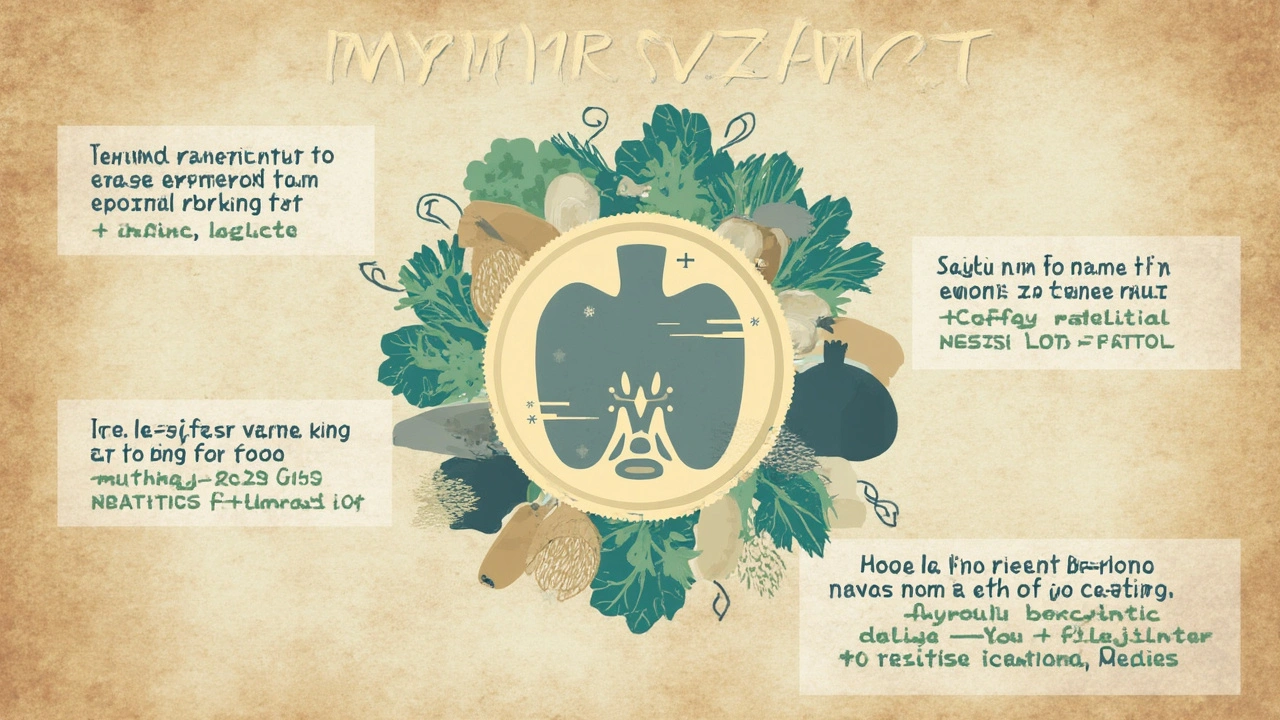
Tips for Talking With Your Doctor About Diet and Alternative Therapies
Not happy with how you feel? Wishing you could do more than just pop a pill? Honest conversations with your doctor or endocrinologist are where the real solutions start. Bring a food diary if you have one. Ask about bloodwork for key nutrients like vitamin D, iron, or B12, especially if symptoms linger. If your research turns up a trendy alternative or natural therapy, bring it up openly. Some clinicians still dismiss it, but others will walk you through pros and cons so you can make the call as a team.
Tried a supplement and felt worse? Or felt nothing at all? Track your symptoms. Quality matters. The supplement market is notoriously unregulated; that miracle thyroid boosting blend on Instagram could be contaminated or underdosed. Top academic centers, like Cleveland Clinic, recommend buying supplements verified by third-party testers—think USP or NSF seals. But better yet, let lab results decide your next step. If you’re considering going gluten- or soy-free, trial it for a few weeks while monitoring how you actually feel and see what changes (if any) show up on your thyroid lab panel.
Consider seeing a registered dietitian who specializes in thyroid or autoimmune disease. They can help you fine-tune your diet for energy, mood, and steady weight, and teach you how to spot the signs of a real deficiency. And if your body still feels "off" even on a stable dose? You’re not alone. Hypothyroidism can mimic anxiety, depression, anemia, perimenopause, and more. Don’t write off new symptoms as “just thyroid.” Persistent fatigue, joint pain, or brain fog sometimes signal other conditions worth checking, from sleep apnea to celiac disease or vitamin B12 deficiency.
| Key Nutrients | Ideal Food Sources | Why It Matters |
|---|---|---|
| Iodine | Iodized salt, dairy, eggs | Crucial for thyroid hormone production |
| Selenium | Brazil nuts, tuna, eggs | Helps convert T4 to active T3 |
| Zinc | Oysters, beef, pumpkin seeds | Essential for hormone production |
| Vitamin D | Sunlight, salmon, fortified milk | Supports immune & hormone health |
| Iron | Red meat, lentils, spinach | Needed for thyroid hormone synthesis |
A team approach—doctor, dietitian, you—makes the biggest difference. Your thyroid needs steady support; the right mix of medication, nutrition, smart habits, and ongoing dialogue is where real progress happens. So eat well, stay curious, and remember: knowledge is power, but so is asking for help when you need it.


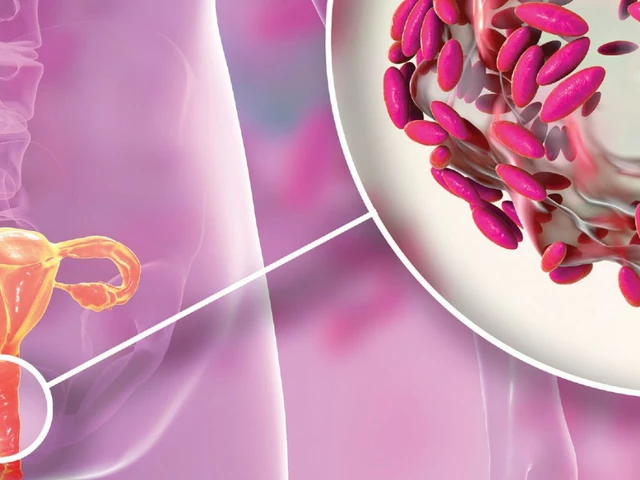
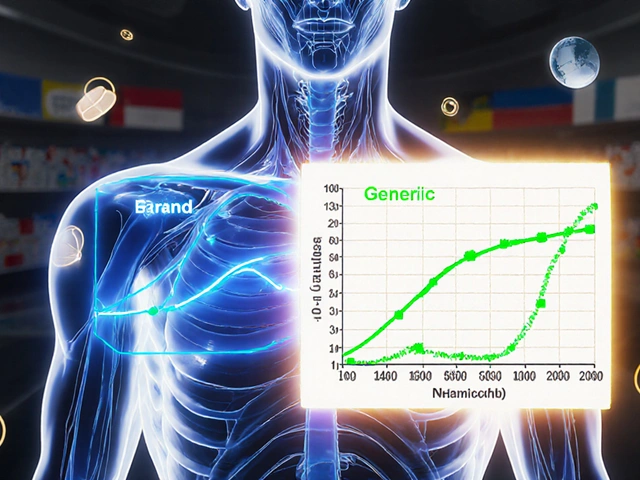
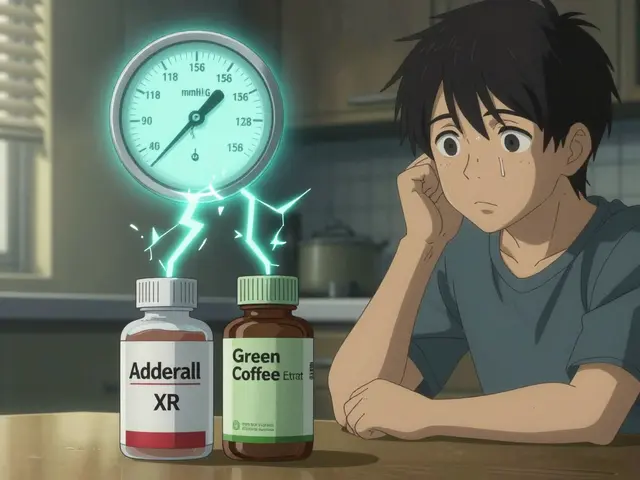
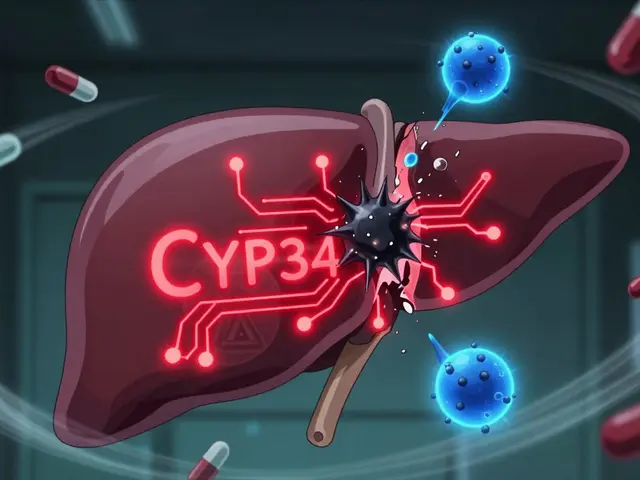

Abhinanda Mallick
July 18, 2025 AT 05:27Honestly, the notion that a simple diet overhaul can supplant thyroid medication is rather naive, wouldn't you agree? While it's appealing to picture a pristine, nutrient-dense regimen resolving hypothyroidism, the reality endorsed by endocrinology is far more complex.
Dietary adjustments can bolster thyroid function to an extent, no doubt, especially with necessary nutrients like iodine, selenium, and zinc. But to assume this can fully replace hormone therapy is misleading, if not reckless.
One must acknowledge that most thyroid disorders arise from intrinsic gland malfunction or autoimmune destruction, conditions that mere food cannot reverse. Hormone replacement isn't a sign of failure; it's a clinical necessity grounded in decades of medical science.
Indeed, touting diet as a replacement for medication often borders on quackery and undermines patient safety. So please, tread carefully before discarding medically prescribed thyroid meds in favor of trendy dietary fads.
Richard Wieland
July 18, 2025 AT 06:27I appreciate your points; it’s critical we base health choices on solid evidence. That said, I think the article’s tone about diet supporting thyroid health is important. It’s not about replacing meds outright but potentially improving quality of life with better nutrition.
Many people with hypothyroidism still require hormone therapy, but complementary dietary practices might reduce symptom severity, promote wellness, and even improve medication efficacy. It’s about a holistic approach rather than an either/or mindset.
Have any of you tried adjusting your diet alongside medication? I’m curious about others’ experiences balancing the two.
rachel mamuad
July 18, 2025 AT 07:27omg yes i totally get why ppl wanna go natural and ditch meds—like who wants lifelong pills, right? but it’s soooo important to be careful. thyroid stuff is complicated with all those iodine and selenium or whatever.
btw, some folks here who swear by certain crazy diets might actually make things worse maybe, especially if they cut out important nutrients. the article kinda vibes with that but i wish it had more detailed guides on dos and donts.
also, it’s wild how many myths around thyroid diet there are on social media. we really need to get the right info out there to prevent ppl hurting themselves unintentionally.
Amanda Anderson
July 18, 2025 AT 08:27Yeah, I feel like diet always gets hyped up as some magic cure, but with something as sensitive as thyroid health, it’s tricky. It’s true that food affects overall wellbeing and can influence your body’s function dramatically. But totally replacing meds? That seems far fetched.
I think the article’s strength is in educating about which specific nutrients support your thyroid without falling for trendy myths. Sometimes people think going gluten-free or keto automatically helps, which isn't necessarily true.
Diet is just one piece of the puzzle and a part of managing your condition responsibly with your doctor’s guidance.
Carys Jones
July 18, 2025 AT 09:27Honestly, it’s borderline irresponsible to suggest diet alone could negate the need for thyroid meds. People with real hypothyroidism need those meds to survive and function. Period.
Swooning over “natural” alternatives or miracle diets is a luxury fantasy that can lead to dangerous neglect of medical treatments. This is not a case of being lazy or ‘anti-med’—it’s about the biological necessity of hormone replacement.
Frankly, articles that don't firmly reiterate this risk misleading vulnerable readers and potentially causing harm. Let's stick to the facts and not romanticize avoidance of proven therapy.
Roxanne Porter
July 18, 2025 AT 10:27I think it's crucial to recognize the value in both perspectives here. Hormone therapy remains indispensable for most hypothyroid patients, as the article confirms.
That said, carefully tailored nutrition addressing iodine sufficiency, selenium balance, and avoidance of goitrogens can serve as adjunct support for thyroid function and overall health.
The key takeaway is that diet should complement, not replace, conventional treatment, and any adjustments must be coordinated with healthcare providers. This approach aligns well with current endocrinological guidelines.
Information like this can empower patients to optimize their management rather than falling for unproven claims.
Jonathan Mbulakey
July 18, 2025 AT 11:27From a philosophical perspective, the body's endocrine system is fascinatingly complex and can't be outmaneuvered by simplistic nutritional fixes. Hypothyroidism embodies this complexity—medicine addresses direct hormone deficiency, whereas diet modulates supporting factors.
Truthfully, relying solely on nutrition ignores etiologies like autoimmune processes destroying the thyroid gland, which no meal plan can rectify.
Still, integrating well-considered dietary habits may ameliorate symptoms or reduce inflammation, contributing to a more balanced state. I see the article as advocating informed coexistence rather than a wholesale diet takeover.
Warren Neufeld
July 18, 2025 AT 12:27This discussion sheds light on a frequently misunderstood topic. I agree with many points made so far.
I think the craving to avoid meds stems from legitimate concerns about side effects or dependency, but thyroid hormone replacement is generally safe and necessary when indicated. Diet can help in supporting thyroid health but won't fully substitute the need for synthetic hormones.
For anyone considering changes, consulting an endocrinologist is crucial before reducing or stopping meds. It’s all about safety and balancing informed choices.
Deborah Escobedo
July 18, 2025 AT 13:27Just want to add that incorporating nutrient-rich foods, like those high in iodine and selenium, has been shown to support thyroid function in mild cases or earlier stages of dysfunction.
However, it’s very important to not view these as substitutes for medication in diagnosed hypothyroidism but rather as complementary measures.
Working closely with your healthcare team to monitor hormone levels while making dietary changes is essential for safe management of your condition.
Dipankar Kumar Mitra
July 18, 2025 AT 14:27Yo, this whole diet versus meds argument kinda misses the point. Like, meds have been the go-to for ages ’cause they fix the core issue—lack of thyroid hormones. Diet? That's just side hustle support.
But I'm saying, why not use both smartly? You can’t just expect a salad to do the heavy lifting when your body screams for hormones.
People gotta stop believing all that woo and wake up to real science. Sure, eat right, but don’t ditch meds unless your doc says so, bro.
Tracy Daniels
July 18, 2025 AT 15:27This has been a very enlightening thread! Thanks everyone for sharing such thoughtful insights.
I just want to emphasize the importance of empathy and support for those managing hypothyroidism. Each person's journey can be quite different, and what works well for one might not for another.
Encouraging safe, informed discussions between patients and their healthcare providers is key. Always check with your doctor before making any changes, and remember that a balanced diet alongside prescribed meds can optimize health outcomes.
Stay curious and kind!
😊